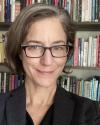Professor Gillian Harkins Office Hours Mon/Wed 1:00-2:00 PM or by appointment
Email: gharkins@uw.edu In-Person Office Hours at 306-A Padelford Hall
English 204 Fall 2022 Virtual Office Hour appointments
Popular Fiction and Media:Time Tales
I want us to pay attention to time. I want myself to pay attention to how we have come to believe that the time we live in, the timing of mechanical objects, the time of technology is merely secular or even just like timed ‘natural’ events – hurricanes, storms, or tornadoes. --- Geeta Patel, “Stories for the Millenium: Disrupting Time” Gay Community News (1998).
Time is an understanding.
This course introduces students to popular culture as a site of critical reflection. In Fall 2022, we will explore popular print and visual media that raise critical questions about time. Our main cultural works will treat various aspects of "temporal" or time-based experience, including treatments of seemingly counter-factual histories or speculative futures. We will read diverse works that ask how popular culture can engage, challenge, and transform various modes of experiential and collective time. This exploration will take us into studies of capitalism, colonialism and imperialism as well as systems of power organized through race, gender, sexuality, and ability. Content Note: Materials in this class are drawn from popular culture and may include material that challenges you. Please reach out to me if you have any concerns. |
|
Course Format: The Course is planned as an in-person course to be held on UW Seattle Campus, circumstances permitting. If we need to move the course on-line, I will adapt our course for delivery through the UW Canvas course platform. To increase course accessibility, I will post powerpoint slides for the upcoming in-class lecture 24 hours in advance. These slides do not replace lecture attendance any more than reading titles would replace the full story, but they will give you a chance to pre-read quotations or bullet point lists or any other magical stuff I drop in there from sources beyond our course reading. For anyone who prefers longer reading times or likes to look up unfamiliar terminology or wants some tips about what parts of the readings I thought were especially interesting, check out the powerpoint slides in advance. |
|
Course Readings: Most readings and videos for this course will be accessible through the Canvas website. There are two books required for the class available for purchase at the University Bookstore: Colson Whitehead, Zone One (2011) and Kazuo Ishiguro, Klara and the Sun (2022). You may also purchase or borrow these books in any edition from other sources. There is one movie required for the class that you will watch independently (outside of class time) that can be rented on streaming services through Amazon, Apple TV, Google Play, and Vudu: Everything, Everywhere, All at Once (Dir. Daniel Kwan and Daniel Scheinert, 2022). If you experience any obstacles accessing course materials, please let me know. |
|
Course Objectives
|
|
Course Requirements: This is an introductory VLPA course that does not have a W credit attached to it. There is no formal graded essay assignment or final exam for this class. Instead the requirements focus on your active, reflective and retrospective learning over the course of the quarter. This replaces a "banked knowledge" approach to course content -- where you memorize or instrumentalize information toward an exam or formal essay -- with one focused on integrated learning as a process, or a practice that happens over time. I'll explain this more in lecture on our first day. Here is how your learning will be assessed in this course:
|
|
Course Policies Academic Conduct: We all share responsibility for creating a positive shared learning community. Everyone is invited to raise questions and offer additional perspectives about any materials discussed in class. Everyone is also expected to contribute their ideas in a manner that is thoughtful and respectful of the ideas expressed by others. Here are some useful guidelines for class discussions. Here are some additional guidelines for online discussions. Academic Integrity: The University takes academic integrity very seriously. Behaving with integrity is part of our responsibility to our shared learning community. Please review this University of Washington website for a definition and explanation of academic misconduct. If you are confused or have any questions about a specific instance, please feel free to see me in advance of the due date. Academic Accommodations: It is the policy and practice of the University of Washington to create inclusive and accessible learning environments consistent with federal and state law. If you have already established accommodations with Disability Resources for Students (DRS), please activate your accommodations via myDRS so we can discuss how they will be implemented in this course. If you have not yet established services through DRS, but have a temporary health condition or permanent disability that requires accommodations (conditions include but not limited to; mental health, attention-related, learning, vision, hearing, physical or health impacts), contact DRS directly to set up an Access Plan. DRS facilitates the interactive process that establishes reasonable accommodations. Contact DRS at disability.uw.edu. Religious Accommodations: Washington state law requires that UW develop a policy for accommodation of student absences or significant hardship due to reasons of faith or conscience, or for organized religious activities. The UW’s policy, including more information about how to request an accommodation, is available at Religious Accommodations Policy, Accommodations must be requested within the first two weeks of this course using the Religious Accommodations Request form. |
|
Additional Resources Additional support for technology access, writing and research support, financial and health needs, food, parenting, and legal resources and have been gathered at this link: https://english.washington.edu/resources-times-need Advising appointments with the new Humanities Advising Center can be scheduled here: https://hasc.washington.edu/schedule-appointment Writing resources can be found online at Ask Betty! and Purdue Online Writing Lab and on UW Seattle campus at Odegaard Writing and Research Center.
|
